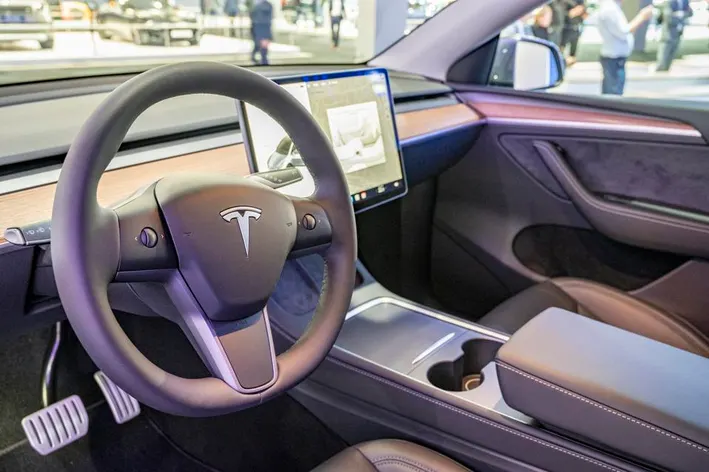In a groundbreaking study published by Reuters Mobility, researchers predict that by 2030, over 58% of global vehicle sales will be electric vehicles (EVs). This surge is largely driven by advances in artificial intelligence (AI) and EV technology, which are revolutionizing the way we think about autonomous travel. As we stand at the cusp of this transformative era, it’s essential to understand how AI and EV innovations are converging to redefine mobility. In this article, we’ll delve into how these technologies are shaping the future of travel, explore the latest advancements, and offer practical insights into what this means for consumers and industry players alike.
1. The Intersection of AI and Electric Vehicles
Understanding the Role of AI in EVs
AI technologies are integral to the development of autonomous vehicles, offering capabilities that enhance safety, efficiency, and user experience. Companies like Tesla, equipped with their sophisticated AI-driven Autopilot system, are leading the charge.
- Navigation and Safety: AI algorithms process data from sensors and cameras to detect obstacles, adjust speeds, and navigate routes. This is pivotal for safe autonomous driving.
- Energy Efficiency: AI optimizes energy consumption by predicting and managing battery performance, which is crucial for extending the range of EVs.
According to TechCrunch, AI-enhanced EVs are expected to reduce traffic congestion by 30% in major urban areas by 2025, highlighting the transformative potential of these technologies.
2. Innovations in Battery Technologies
Powering the Future with Advanced Batteries
The heart of any EV lies in its battery, and innovations in this field are propelling the industry forward. Specialists from Battery University and PV Magazine report significant advancements, such as:
- Solid-State Batteries: Offering higher energy density, faster charging times, and increased safety compared to traditional lithium-ion batteries.
- Recycling and Sustainability: Companies like Rivian and Volkswagen are investing in battery recycling technologies to make EVs more sustainable.
According to the International Energy Agency (IEA), these innovations could reduce battery costs by up to 50% by 2030, making EVs more accessible to the average consumer.
3. Autonomous Travel: A Global Perspective
The Worldwide Race for Autonomous Tech
Globally, countries and companies are racing to be at the forefront of autonomous travel. From the bustling streets of Beijing to the tech-savvy lanes of Silicon Valley, the competition is fierce.
- China: BYD and NIO are investing heavily in AI to develop fully autonomous vehicles by 2025.
- Europe: Volkswagen and Hyundai are collaborating on autonomous driving tech, aiming for mass deployment by the end of the decade.
- USA: Ford and Lucid Motors are pioneering integration of AI in EVs, focusing on user-centric designs and smart-city compatibility.
A report by Bloomberg Green anticipates that autonomous vehicles could make up 20% of the total car fleet in developed countries by 2035, indicating a significant shift in global mobility trends.
4. Practical Insights for Consumers and Industry Players
Navigating the Future of Autonomous Travel
For consumers and industry players, understanding these innovations is crucial for making informed decisions.
- How to Charge: With the expansion of fast-charging networks like Tesla Supercharger and IONITY, charging an EV is becoming quicker and more convenient. Aim for stations offering at least 150 kW for optimal charging speed.
- Where to Buy: Look for companies with a proven track record in AI and EV technology, such as Tesla, Ford, and Hyundai, which offer comprehensive support and updates.
- What to Compare: Evaluate vehicles based on AI capabilities, battery range, and safety features. A side-by-side comparison of models like the Tesla Model S and the Ford Mustang Mach-E can illuminate key differences.
Conclusion: Embracing the Future
The convergence of AI and EV innovations is undoubtedly shaping the future of autonomous travel, offering a glimpse into a world where vehicles are smarter, safer, and more sustainable. As these technologies continue to evolve, they promise to redefine the very nature of mobility, offering unprecedented opportunities and challenges alike. Whether you’re a consumer eager to adopt the latest EV or an industry player seeking to innovate, staying informed and adaptable will be key to thriving in this new era.
What excites you most about the future of autonomous travel? Join the conversation below and share your thoughts on how AI and EV innovations are transforming our world. As we look ahead, the journey towards a more connected and sustainable future is not just a possibility but an inevitable reality waiting to unfold.

